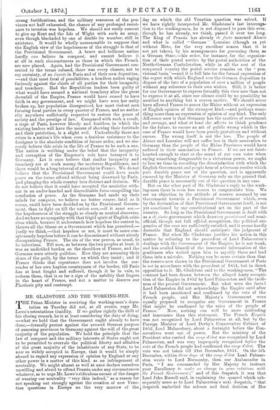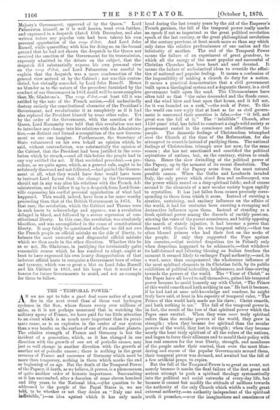MR. GLADSTONE AND THE WORKING-MEN.
THE Prime Minister in receiving the working-men's depu- tation on Tuesday did not, at all events, copy Mr. Lowe's ostentatious timidity. If we gather rightly the drift of &is closing remark, he is at least considering the duty of doing, —what we hold that the Government ought already to have done,—formally protest against the avowed German purpose 'of annexing provinces to Germany against the will of the great majority of the population. We hold the principle that the law of conquest and the military interests of States ought not to be permitted to overrule the political liberty and affinities of the great majority of the inhabitants of any State, to be now so widely accepted in Europe, that it would be simply absurd to regard any expression of opinion by England or any -other power in a matter of this kind, as an infringement of neutrality. We might almost as well at once declare ourselves unwilling and afraid to offend Prussia under any circumstances whatever, as to urge Mr. Lowe's ridiculous excuse of the danger -of wearing our neutrality "very thin indeed," as a reason for not speaking out strongly against the creation of new Vene- tian questions in Europe on the very morrow of the day on which the old Venetian question was solved. If we have rightly interpreted Mr. Gladstone's last interroga- tion to the working-men, he is not disposed to pass this over, though he has already, we think, passed it over too long. The King of Prussia has already de facto annexed Alsace and what is called " German " Lorraine (though as yet without Metz, for the very excellent reason that it is not yet taken), by his arrangements for governing them as a German State,—his order, for instance, for the organiza- tion of their postal service by the postal authorities of the North-German Confederation, while in all the rest of the conquered country the postal service remains on the " pro: visional basis,"—and it is full late for the formal expression of the regret with which England sees the German disposition to dispose of the fate of a population of over a million of people without any reference to their own wishes. Still, it is better for our Government to express formally this view now than not to express it at all, since our silence could by no possibility be ascribed to anything but a craven motive. We should never have allowed France to annex the Rhine without an expression of English opinion of the strongest kind,—and perhaps some- thing more than an expression of opinion of any kind. The only difference now is that Germany has the motives of resentment and revenge, and what at least she affects to think prudence for the future, to excuse an act of public wrong which in the case of France would have been purely gratuitous and without excuse. The wrong itself is not the less. The people of Alsace and Lorraine will not suffer less in their annexation to Germany than the people of the Rhine Provinces would have suffered in their annexation to France. If we are not faint- hearted enough to start at the sound of our own voice when saying something disagreeable to a victorious power, we ought to lose no time in recording the dissatisfaction with which the English Government and people hear of a German resolve which puts durable peace out of the question, and is apparently excused by the Minister of Germany only on the ground that durable peace is necessarily out of the question in any case.
But on the other part of Mr. Gladstone's reply to the work- ing-men there is even less reason to congratulate him. We see no objection to the attitude of reserve assumed by our Government towards a Provisional Government which, even by the declaration of that Provisional Government itself, is not yet sanctioned by any constitutional act on the part of the country. So long as the Provisional Government is dealt with as a de facto government which deserves provisional and semi- official, though not full official recognition, the political exi- gencies of the case are sufficiently satisfied, and it seems hardly desirable that England should anticipate the judgment of France. But when Mr. Gladstone justifies his action in this matter by referring to the precedent of Lord Palmerston's dealings with the Government of the Empire, he is not frank, and has availed himself of the inaccurate information of the gentlemen who waited upon him to mystify them and lead them into a mistake. Nothing can be more certain than that the reserve now shown to the Provisional Government of Paris is not in accordance with the precedent of 1851, but in direct opposition to it. Mr. Gladstone said to the working-men, "The contrast had been drawn between the alleged hasty recogni- tion of the Empire in 1852 by Lord Palmerston and the tardi- ness of the present Government. But what were the facts ? Lord Palmerston did not acknowledge the Empire until after it had been sanctioned and confirmed by the vote of the French people, and Her Majesty's Government were equally prepared to recognize any Government in France that might be confirmed by the voice of the people of France." Now, nothing can well be more misleading and inaccurate than this statement. The French Empire was not recognized by Lord Palmerston at all, but by the Foreign Minister of Lord Derby's Conservative Cabinet of 1852, Lord Malmesbury, about a fortnight before the Con- servatives went out of power. But the ministry of the President who carried the coup d'etat was recognized by Lord Palmerston, and was very improperly recognized before the vote of the French people had confirmed the coup d'Itat. The vote was not taken till 21st December, 1851. On the 5th December, within three days of the coup d'etat Load Palmer- ston wrote to Lord Normanby, then our Ambassador in Paris, " I am commanded by Her Majesty to instruct your Excellency to make no change in your relations with the French Government ;" and of this despatch it was that Lord John Russell said, in explaining the quarrel which sub- sequently arose as to Lord Palmerston's next despatch, "that despatch embodied the solemn and final decision of Her Majesty's Government, approved of by the Queen." Lord Palmerston himself, as it is well known, went even further, and expressed in a despatch (dated 16th December, and also written before any popular vote had been taken) his own personal approbation of the coup de'tat. And Lord John Russell, while quarrelling with him for doing so, on the formal ground that he had not shown the despatch to the Queen nor received the sanction of the Government for its transmission, expressly admitted in the debate on the subject, that the despatch did substantially express his own personal view on the coup de'tat, and Lord Palmerston was careful to explain that the despatch was a mere condensation of the general view arrived at by the Cabinet ; nor was this contra- dicted, but virtually conceded, by Lord John Russell. Hence no blunder as to the nature of the precedent furnished by the conduct of our Government in 1851 could well be more complete than Mr. Gladstone's. The coup d'e'tat,—at least till it was ratified by the vote of the French nation,—did undoubtedly destroy entirely the constitutional character of the President's Government, and revolutionize it as completely as if it had also replaced the President himself by some other ruler. Yet by the order of the Government, with the sanction of the Queen, Lord Normanby was told that this revolution was not to introduce any change into his relations with the Administra- tion,—as distinct and formal a recognition of the new Govern- ment as one can imagine. Furthermore, the Secretary of State volunteered on his own behalf an opinion which, he said, without contradiction, was substantially the opinion of the Cabinet, that the President had been justified in the revo- lution which he struck,—and all this before the people had in any way ratified the act. If that wretched precedent,—a pre- cedent, as we quite agree, which, as a general rule, ought to be sedulously disowned and not followed,—had guided the Govern- ment at all, what they would have done would have been to instruct Lord Lyons that the change in the Government should not in any way alter his relations with the French Ad- ministration, and to follow it up by a despatch from Lord Gran- ville expressing his cordial personal approbation of what had happened. This would, indeed, have been a far more worthy proceeding than that of the British Government in 1851. In that case, the revolution, which the Cabinet and Throne were in such haste to acknowledge and approve, was a revolution deluged in blood, and followed by a severe repression of con- stitutional liberty. In this case, the revolution was absolutely bloodless, and was accomplished in the cause of constitutional liberty. It may fairly be questioned whether we did not owe the French people an official mistake on the side of liberty, to balance the most unworthy and disgraceful official mistake which we then made in the other direction. Whether this be so or not, Mr. Gladstone, in justifying the intrinsically quite reasonable course which he has resolved to adopt, ought at least to have expressed his own hearty disapprobation of that indecent official haste to recognize a Government born of crime and tyranny, which was so great a blot on Lord John Russell and his Cabinet in 1851, and his hope that it would be a beacon for future Governments to avoid, and not an example for them to follow.































 Previous page
Previous page